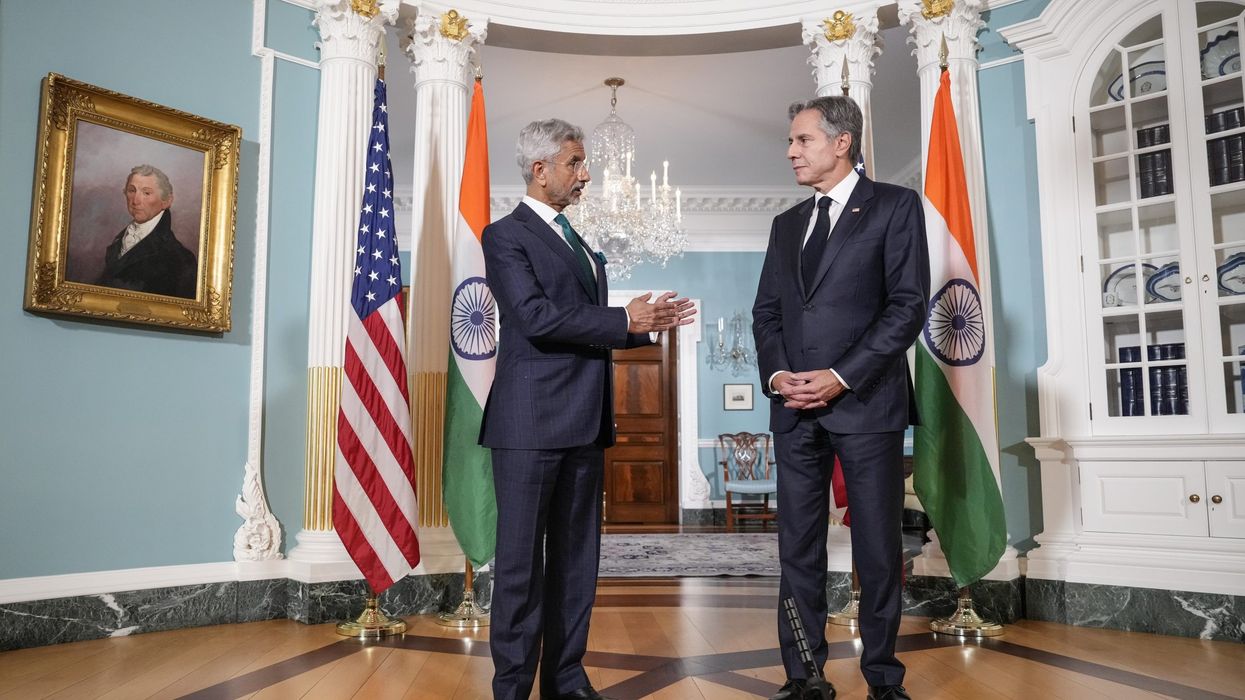US Secretary of State Antony Blinken has called on India to "cooperate fully" with the ongoing Canadian investigation into the killing of a Khalistani separatist, a senior State Department official said on Friday (29).
This statement came a day after external affairs minister S Jaishankar met with the top American diplomat.
Jaishankar is currently on a five-day official trip to Washington DC. Thursday's meeting at the State Department was the highest-level interaction between the two countries after the recent G-20 Summit in New Delhi when president Joe Biden and prime minister Narendra Modi met.
Jaishankar also confirmed for the first time that the US side raised the diplomatic row between India and Canada over the killing of Sikh separatist Hardeep Singh Nijjar in British Columbia in June this year.
“Yes, I did,” Jaishankar said in response to a question during his appearance at the prestigious Hudson Institute think-tank when asked if the issue of Canadian allegations came up during his meeting with Blinken at the Foggy Bottom headquarters of the State Department. The US side shared its assessments on this whole situation and he explained to the Americans a summary of India's concerns.
“I think hopefully we both came out better informed,” Jaishankar said.
Canadian prime minister Justin Trudeau has alleged that the Indian government was behind the killing of Nijjar on June 18. India had designated Nijjar as a terrorist in 2020. India has rejected Canada's allegations as "absurd" and "motivated".
Earlier, the state department said Blinken met with Jaishankar and the two leaders discussed a full range of issues, including key outcomes of India's G20 presidency, and the creation of the India-Middle East-Europe Economic Corridor and its potential to generate transparent, sustainable, and high-standard infrastructure investments.
The Secretary and the External Affairs Minister also emphasised the continued importance of cooperation ahead of the upcoming 2+2 Dialogue, in particular in the areas of defense, space, and clean energy, the statement said without mentioning about the India-Canada diplomatic standoff.
"Great to meet my friend US Secretary of State @SecBlinken at the State Department today. A wide-ranging discussion, following up on PM @narendramodi's June visit. Also exchanged notes on global developments. Laid the groundwork of our 2+2 meeting very soon," Jaishankar posted on Twitter on Friday.
"Thank you to Indian External Affairs Minister @DrSJaishankar for hosting @POTUS earlier this month. We discussed India's successful G20 presidency, creation of the India-Middle East-Europe Economic Corridor, and the upcoming #USIndia 2+2 Dialogue in New Delhi," Blinken posted on Twitter.
“I actually look forward to seeing you in Delhi for the 2+2,” Jaishankar told Blinken, as the latter welcomed him at the Foggy Bottom headquarters of the State Department for the meeting.
India will host the fifth edition of India-US 2+2 Ministerial Dialogue, Jaishankar announced on Thursday.
Although he did not reveal the dates of the meeting, it is learnt that the ministerial dialogue would be held in the first half of November.
The US delegation would be represented by Blinken along with Defence Secretary Lloyd Austin. Jaishankar and Defence Minister Rajnath Singh will lead the Indian delegation.
The last 2+2 ministerial was held in Washington DC on April 11. Started during the previous Trump administration, the first 2+2 ministerial was held in New Delhi on September 6, 2018.
"Focused discussion on India-US collaboration on critical and emerging tech and creating resilient supply chains at discussion convened by @USISPForum," Jaishankar said in another post on Twitter.
"Glad to know that India is the major talking point in corporate boardrooms. Our collaboration offers more possibilities with each passing day," he said.
Jaishankar, who arrived here from New York on Wednesday after addressing the 78th General Assembly session of the United Nations on Tuesday, held a series of meetings with top Biden administration officials on Thursday.
He started the day with a visit to the White House for a meeting with National Security Advisor Jake Sullivan. The White House did not issue a readout of the meeting. “Recognised the tremendous progress in our bilateral relationship this year and discussed taking it forward,” Jaishankar posted on Twitter.
After a meeting with representatives of the think tanks from Washington DC, Jaishankar met US Trade Representative Katherine Tai. “Spoke about our expanding trade and economic relationship and its broader significance,” he wrote on Twitter.
“Today I met with” Jaishankar “to discuss the positive momentum of the U.S.-India trade relationship, and opportunities to collaborate on WTO reform and IPEF negotiations,” Tai said. Jaishankar described his meetings with the think tanks as an open and productive conversation.
“Discussed transformations underway around the world and India's growing role,” he said. Jaishankar also met members of the US Congress on Thursday."
Pleased to meet Members of Congress, Administration, business and think tank heads at India House.
"Our regular conversations keep India-US relationship strong," he wrote on Twitter.
(PTI)




